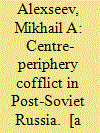| Srl | Item |
| 1 |
ID:
001927


|
|
|
|
|
| Publication |
London, Macmillan, 1999.
|
| Description |
vi, 298p.
|
| Standard Number |
0333765281
|
|
|
|
|
|
|
|
|
|
|
|
Copies: C:1/I:0,R:0,Q:0
Circulation
| Accession# | Call# | Current Location | Status | Policy | Location |
| 043127 | 320.947/ALE 043127 | Main | On Shelf | General | |
|
|
|
|
| 2 |
ID:
173892


|
|
|
|
|
| Summary/Abstract |
Do international economic sanctions backfire politically, resulting in increased rather than decreased domestic support for targeted state leaders? Backfire arguments are common, but researchers have only recently begun systematically studying sanctions’ impact on target-state public opinion, not yet fully unpacking different possible backfire mechanisms. We formulate backfire logic explicitly, distinguishing between ‘scapegoating’ and ‘rallying’ mechanisms and considering the special case of ‘smart sanctions’ aimed at crony elites rather than the masses. We test five resulting hypotheses using an experimental design and pooled survey data spanning the imposition of sanctions in one of the most substantively important cases where the backfire argument has been prominent: Western sanctions on Russia in 2014. We find no evidence of broad sanctions backfire. Instead, sanctions have forced Russia’s president to pay a political price. But this price has been low compared to the massive political benefits we document arising from the sanctions-triggering event, the Crimea annexation. Moreover, hidden by aggregate figures are signs of a ‘backlash of the better-off’ by which ‘smart’ sanctions turn economic well-being from a predictor of opposition into a predictor of regime support.
|
|
|
|
|
|
|
|
|
|
|
|
|
|
|
|
| 3 |
ID:
068951


|
|
|
| 4 |
ID:
109915


|
|
|
|
|
| Publication |
2011.
|
| Summary/Abstract |
The societal security theory posits that extreme anti-migrant hostility - such as demands to deport all migrants unconditionally - emerges when host communities see migration as a threat to the survival of their group identity. An alternative interpretation - the immigration security dilemma - attributes extreme hostility to the human tendency to prepare for the worst under uncertainty when central authority weakens. Does extreme intergroup hostility relate more to threats framed in terms of group survival or to those framed in terms of uncertainty about government capacity and migration effects? I investigate this question empirically with the Russian national survey data (2005, N = 680) asking who in Russia supports the deportation of all internal and external migrants, legal and illegal, and their children to their places of origin - an extreme and widespread view that would require forced population movements not seen in the region since Stalin's Great Terror. In multivariate tests, agreement with the societal security (survival) rhetoric explained about five percent of variation in support for unconditional, wholesale deportation of migrants; agreement with the security dilemma (uncertainty) rhetoric - about 20%. A comparison of attitudes in the same survey to Armenian, Uzbek, Chechen, and Chinese migrants and the association of each ethnic group with different types of security threat further support this finding. Hostility toward ethnic groups viewed as a weak security threat was more diagnostic of public support for wholesale deportation of migrants than hostility toward groups viewed as a strong security threat.
|
|
|
|
|
|
|
|
|
|
|
|
|
|
|
|